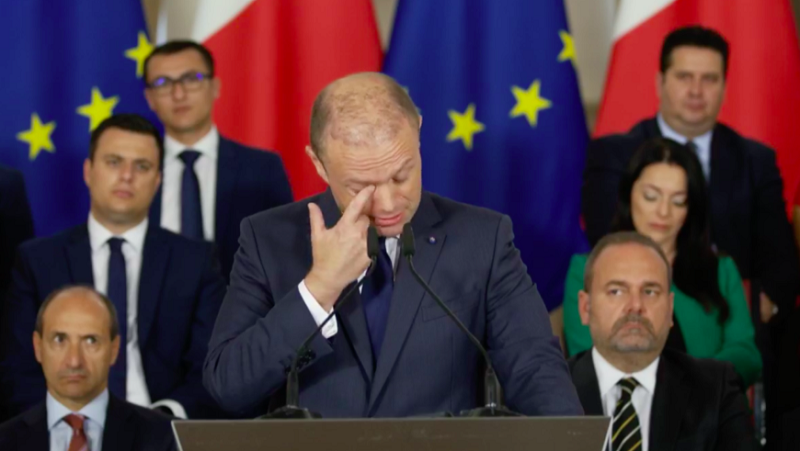As the government intensifies its disinformation campaign in light of the Egrant inquiry involving the Prime Minister, The Shift News takes stock of the most commonly used techniques for spreading false stories, misleading you, and eliminating your right to know.
1. Ridicule, discredit, diminish
The government marginalises facts (using the Egrant inquiry summary to obscure the undisputed fact that Keith Schembri and Konrad Mizzi own “Egrants” of their own), marginalises critics (like the 30-year dehumanisation campaign against Daphne Caruana Galizia and now against whistleblower Maria Efimova), and undermines authorities (like junior minister Silvio Schembri calling the European Banking Authority’s formal investigation into the FIAU “routine”) to signal to you that any criticism will be met with aggression or, at best, a dismissal.

2. Whataboutism
The government continually uses false comparisons to excuse their failings. The response to accusations of grand corruption and financial crime at the highest levels of government often reaches bizarre points. When the Portuguese Socialist MEP Ana Gomes highlighted un-prosecuted cases of corruption in Malta following her visit to the country, Labour MP Rosianne Cutajar tweeted in reference to Daphne Caruana Galizia’s assassination: “In Malta investigations have led 2 d arrest of 3 suspects in under 6 months & prosecution is underway. I love Portugal but if u want to make comparisons could u tell us how many people were prosecuted so far regarding the abduction of Madeleine McCann? (11 YEARS ago)”. Gomes replied with “disgusting”.
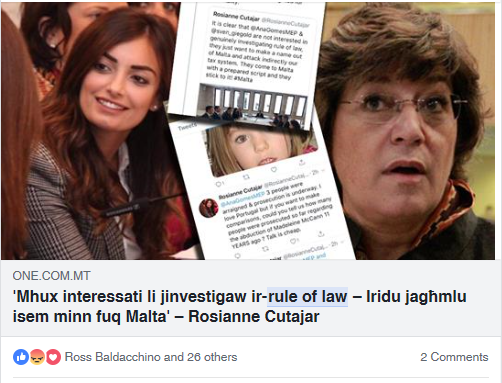
3. Wolf cries wolf
The government aggressively vilifies people and institutions for the acts they commit themselves. As the government continues its assault on what’s left of Malta’s State institutions, damaging in the process the country’s international reputation, the government labels opposition politicians who speak out against its assault on the State as “traitors” and “enemies of the people” , while its supporters call for critics to be burnt alive and stoned, exiled, and stripped of their citizenship.
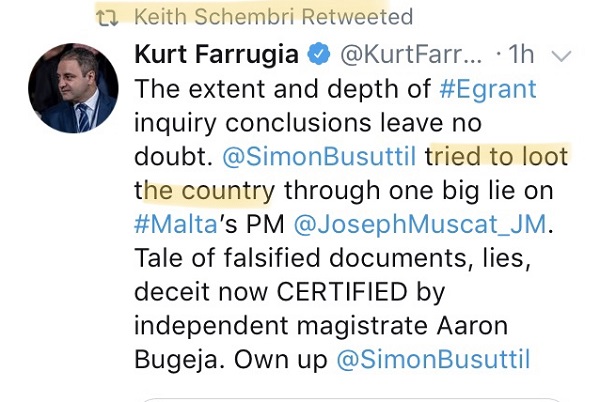
4. Setting the context
The government uses its privileged access to sensitive State information to set the context for its pre-fabricated narratives, getting in its spin early and allowing it to set the narrative while everyone else has to play catch up. This is most evident in the way the Prime Minister handled the publication of the Egrant inquiry report’s conclusion, with his staff tweeting a week before publication that it would be published, and his head of communications tweeting photos of the entire report. The government, especially because its senior officials are suspects in the inquiry, should not have had access to the report. Instead, we were blasted with countless ready-made memes, videos, and articles claiming that the Prime Minister has been “vindicated” on the same day the report summary was published. No one aside from the Prime Minister’s office, the Attorney General, and Magistrate Bugeja have seen the full report. The same is true of the December 2017 arrests of the 10 men charged in connection with Caruana Galizia’s assassination: the Prime Minister, in place of the police commissioner, gave a press conference while the arrests where still ongoing celebrating the government’s success.
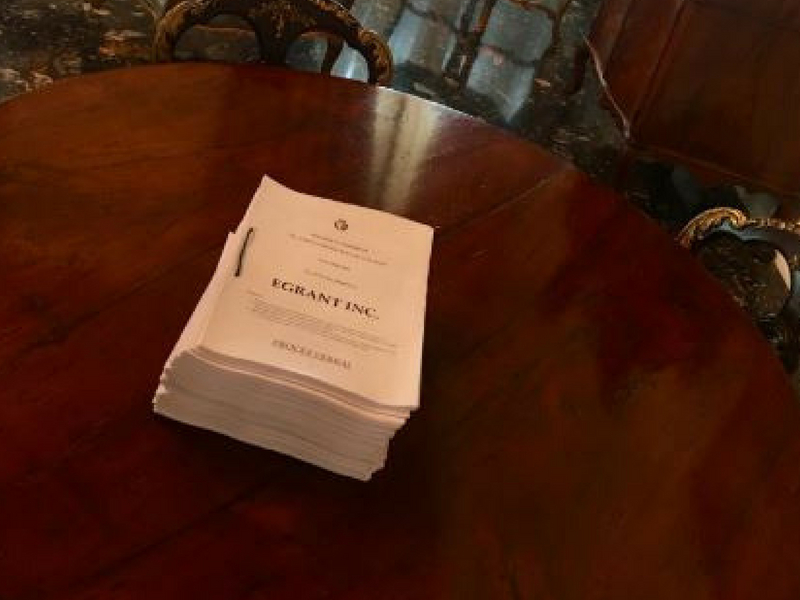
The full Egrant inquiry shown on Twitter by Prime Minister’s Head of Communications Kurt Farrugia.
5. Whitewashing and over-generalisation
The government and Labour Party, along with government-friendly media, over-generalise events to lead you away from crucial details and towards pro-government conclusions. The government has aggressively marketed the summary of the Egrant inquiry as an unconditional cleansing of the slate, although the inquiry does not rule on guilt or otherwise and is simply a list of evidence collected by a duty magistrate. Konrad Mizzi (known to own an “Egrant” of his own) posted a video on Facebook saying the inquiry absolved not only the Prime Minister, but also Mizzi himself, Keith Schembri (also known to own an “Egrant” of his own) and all others mentioned by Caruana Galizia on money laundering and corruption allegations. Mizzi and Schembri are subject to separate independent inquiries, which the government is trying to block using all available means. The selective and shrewd dripping of information on this inquiry is feeding propaganda that twists the narrative before people are able to digest and question, and even then the key pieces of the puzzle are hidden.

Tourism Minister Konrad Mizzi posted a video on Facebook saying the inquiry absolved not only the Prime Minister, but also Mizzi himself, which is not true.
6. Loaded words and drowning facts with emotion
The government prioritises emotions over facts by appealing to your emotions when presenting an event or story. When the Prime Minister gave his “Egrant press conference”, he talked about his wife and children, at a point stopping to shed tears. The narrative he began shaping from that point on was of all investigations into Egrant, which are set to continue by independent journalists given we still have not established ownership, as a cruel witch hunt; an allegation invented for the express purpose of upsetting his wife and children. The facts are that Egrant was set up by the same government advisor, Nexia BT, in the same email to the now defunct Mossack Fonseca in Panama, as the other two Panamanian companies – those owned by Muscat’s closest officials, Konrad Mizzi and Keith Schembri. The Prime Minister, if not directly involved in corrupt activity himself, is engulfed by it, and should never be above suspicion. The Prime Minister head of communications, Kurt Farrugia, is now layering on the emotional aspect by describing the investigation as a “lynching” of Muscat and his family while he and other government officials refer to Caruana Galizia’s assassination as a “death”, a “tragic event”, and something that was to be expected.
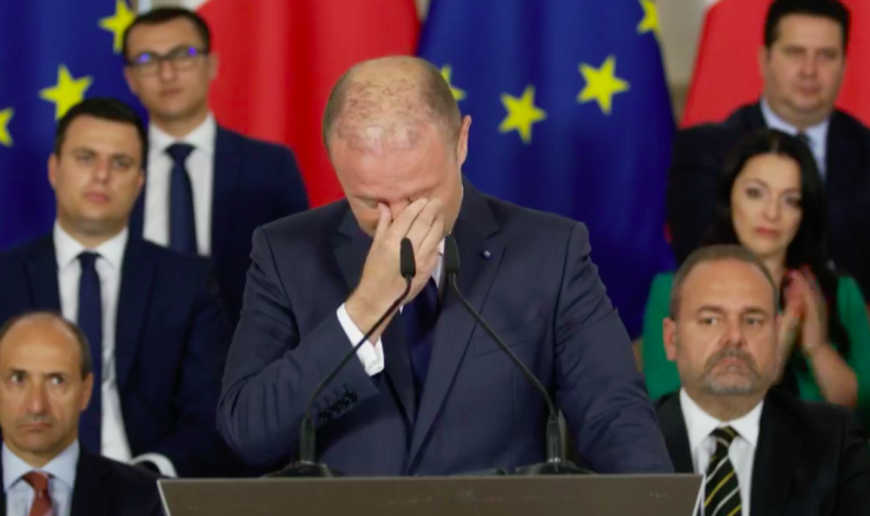
7. Card stacking
The government selectively presents statements and omits key facts to guide you to a view that fits its false narrative. When the European Commission published its country recommendations for Malta in May 2018, the Prime Minister said that its report praised the government’s fight against corruption and money laundering, basing himself on a single sentence that noted the government’s work on controlling aggressive tax planning. The EC report was, in fact, highly critical of Malta’s inefficient and ineffective justice system, its failures to fight corruption, and its failure to control money laundering. During the same week, justice minister Owen Bonnici declared that “Malta achieve[d] the best results in the EC’s Justice Scoreboard”, basing himself on a single score of the Scoreboard’s 36 main indicators across which Malta performed exceptionally poorly.
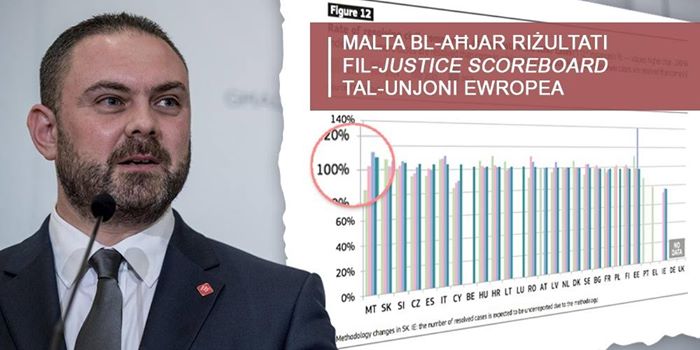
8. Reputation laundering
The government uses narrow achievements in specific areas of human rights to obscure its outright abuses of human rights in general. While the government takes every opportunity to celebrate LGBTIQ rights, in a strategy called “pinkwashing”, it simultaneously abuses the rights of anti-corruption activists, suppressing their right to protest; journalists, suppressing their right to write freely; Caruana Galizia’s family, suppressing their right to an independent and impartial murder investigation; and refugees, suppressing their right to asylum. Meanwhile, secret pro-Muscat Facebook groups are littered with countless violently homophobic, misogynistic, and racist posts about activists, journalists, and opposition politicians.
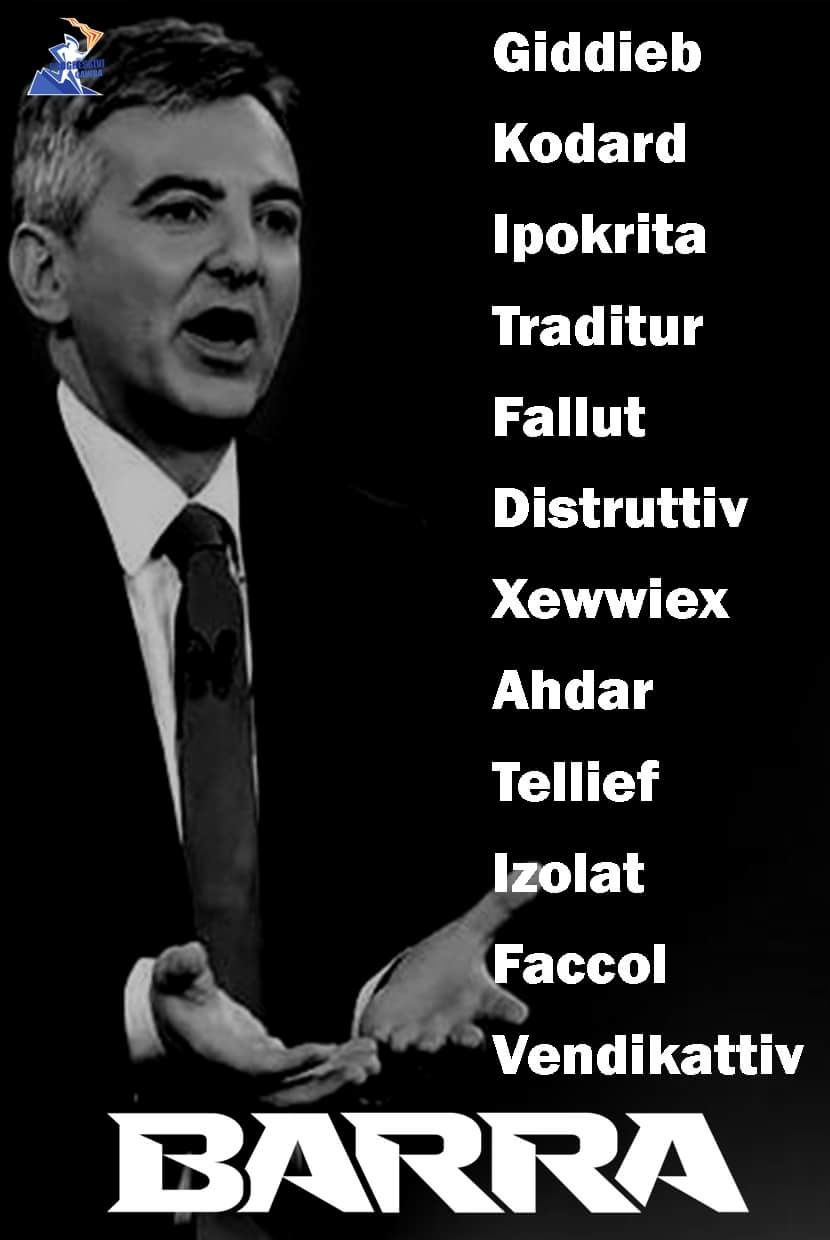
9. Changing the quotation, source or context
The government reports material from other sources, but does so selectively to distort the original message from one of criticism to one of support. In what was the Prime Minister’s last unscripted interview, with BBC Newsnight at the start of the year, interviewer John Sweeney described Muscat as Europe’s “artful dodger”. The interview was universally described as a disaster for Muscat. The government is now using selected clips from the interview in which Muscat discredits Pilatus Bank whistleblower Maria Efimova, providing no other context and no response from Sweeney, but ensuring the BBC’s logo appears in the clip and so exploiting the BBC’s reputation.
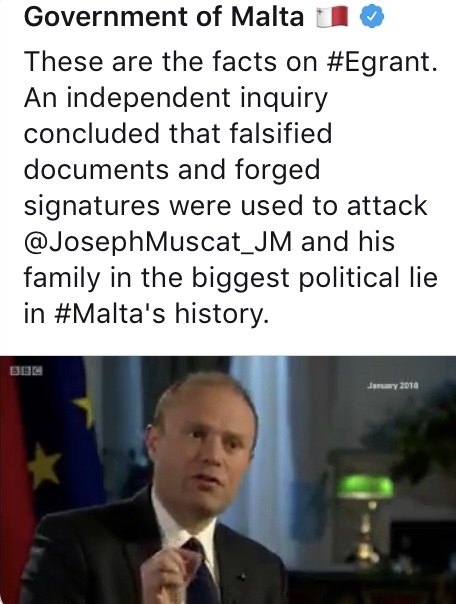
10. Narrative laundering
The government uses so-called experts of dubious integrity and independence to present false facts or narratives as the truth. Justice minister Owen Bonnici was unable to find one good reason to vote down opposition MP Jason Azzopardi’s ‘anti-SLAPP bill’ designed to protect Maltese journalists from vexatious libel lawsuits in foreign jurisdictions, so he turned to three ‘experts’ to recommend the Bill’s rejection: the Attorney General, who’s the government’s legal advisor and has never acted against the government; Ian Refalo, who is acting in the “Panama Papers” case for Keith Schembri, Konrad Mizzi and Adrian Hillman; Paul Cachia, a Labour Party apparatchik; and London’s Bird & Bird, which the government previously paid to respond to the MEPs’ report into Malta’s rule of law failings. Governing MPs all voted down the Bill, claiming it conflicted with EU law, a claim debunked by EC Justice Commissioner Věra Jourová soon after.
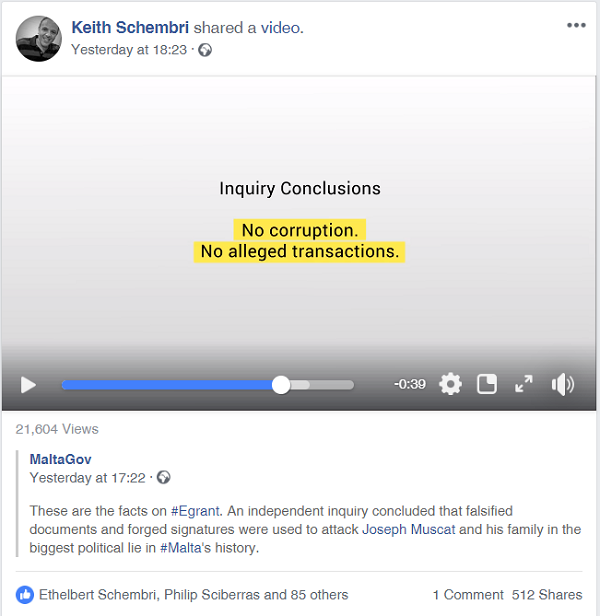
11. Ping pong
The government and Party officials use a network of secret pro-Muscat Facebook groups and their extensive Party media to manufacture news cycles based on lies and half-truths, manipulating your understanding of events and the news around them. The typical series of events involves Party activists manufacturing a scandal, passing the manufactured scandal onto Party controlled media, using those media reports to bait pro-Muscat group members into reacting with outrage, and who then direct their hate at individual citizens and anti-corruption activists. These cycles are pushed until mainstream media begins reporting on them and legitimising them The manufactured outrage about Mark Montebello being “censored” – that is, asked not to write about the Church’s position on the government’s Embryo Bill by the provincial of his order – which was then used to direct anger at the Archbishop and opposition illustrates this technique.
12. Conspiracy theories
The government and Labour Party propagate rumours, myths, and conspiracy theories to confuse you. Within hours of Daphne Caruana Galizia’s assassination, government and Party officials began spreading rumours that opposition leader Adrian Delia, diesel smugglers, and Caruana Galizia’s own adult children were responsible for her assassination. Labour MP Robert Abela recently claimed in parliament that Caruana Galizia’s family have no interest in finding out who her murderers are. The government also employs reverse conspiracy theories in which it labels factual stories and events as conspiracies, as seen in the government’s rubbishing of EU and Council of Europe’s critical reporting on Malta as being motivated a conspiracy of States that are jealous of Malta’s economic success.
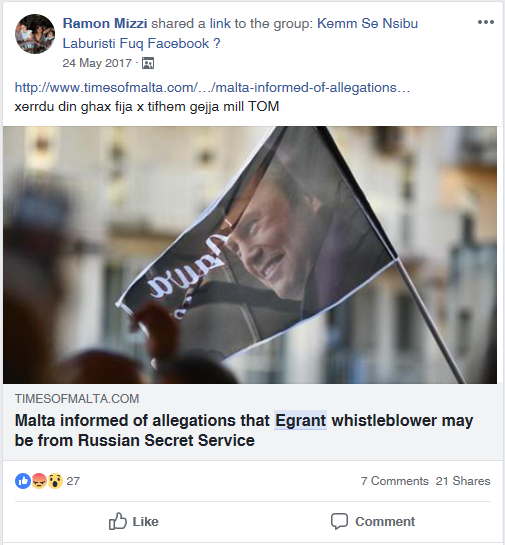
13. Creating and joining the bandwagon
Labour MPs and government officials create the impression that the “majority” is always in line with government PR, using the “majority” to legitimise a false narrative and make you feel excluded and marginalised. The government’s criticism of PN as the “negative party” and that people are fed up of “negativity” is evidence of this, as are Labour MPs saying that “people want to move on” with their lives after the assassination of Caruana Galizia, who one Labour MP said was “disliked by the great majority”.
14. False dilemma
Government officials try forcing you into a false binary choice, typically “us” versus “them” or on particular issues. Consultant to the Prime Minister Robert Musumeci reacted to public outrage over the ‘Rabat Road’ tree uprooting by tweeting: “Trees taking the road design agenda. Fair enough. Still concerned about potholes & waiting times?” Musumeci excluded the possibility of having both trees and good roads.
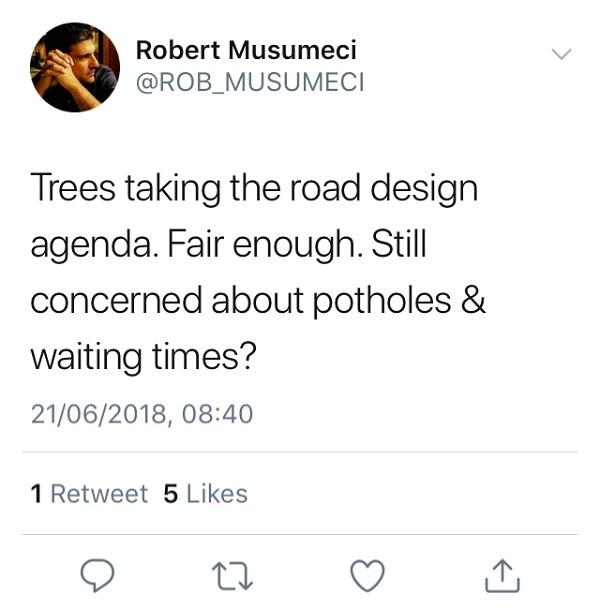
15. Media blackouts
The government uses its control of the State broadcaster TVM, which has a constitutional obligation to impartiality and fair reporting, to systematically under-report important news items, hiding them from viewers and readers when those items are harmful to the government and the Labour Party’s reputation. The Shift News’ analysis found no difference in the reporting coverage pattern of TVM and Labour’s ONE, with both systematically under-reporting the same important news items, but found dramatic differences in the reporting coverage pattern of TVM and other media, including The Times of Malta, The Malta Independent, MaltaToday and LovinMalta.
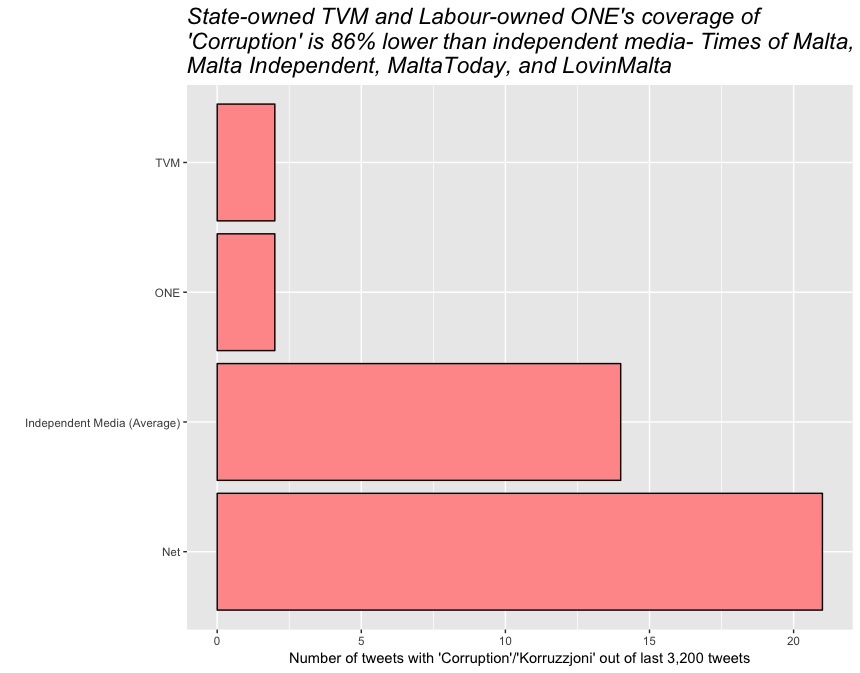
16. Misleading headlines
Government-friendly newspapers use misleading headlines, even when the statements in the underlying article are mostly correct, which are then exploited by government officials. Transport Minister Ian Borg shared on Facebook a MaltaToday article on his ever-changing plans for tree-uprooting along ‘Rabat Road’ because the title exclaimed that ‘only 15 trees [are] be uprooted’ even though the underlying article made clear that hundreds of trees will in fact be uprooted. Borg added ‘#realnews #notfakenews’ to his Facebook post.

